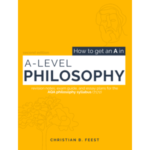J.L. Mackie’s argument from queerness is an argument for moral anti-realism (the meta-ethical view that there are no objective moral properties and facts). Or, to frame it the other way round, it is an argument against moral realism. In other words, Mackie thinks that ‘good’ and ‘bad’ are – at best – just something that exist in our minds.
Mackie’s argument from queerness is essentially that the kind of mind-independent moral properties posited by moral realism would be so weird (queer) compared to other properties that exist that we should reject their existence.
The queerness of these mind-independent moral properties – of objective ‘good’, ‘bad’, ‘right’, ‘wrong’, etc. – has 2 parts:
Metaphysical queerness
“Plato’s Forms give a dramatic picture of what objective values would have to be. The Form of the Good is such that knowledge of it provides the knower with both a direction and an overriding motive; something’s being good both tells the person who knows this to pursue it and makes him pursue it. An objective good would be sought by anyone who was acquainted with it, not because of any contingent fact that this person, or every person, is so constituted that he desires this end, but just because the end has to-be-pursuedness somehow built into it. Similarly, if there were objective principles of right and wrong, any wrong (possible) course of action would have not-to-be-doneness somehow built into it.”
– J.L. Mackie: Ethics: Inventing Right and Wrong (chapter 1, section 9)
 Every other objective property – like shape or height – just is. These properties don’t tell us what we should and shouldn’t do. It’s not like ‘squareness’ or ‘being 10 metres tall’ demand we act or don’t act in certain ways – they’re just physical properties and nothing more.
Every other objective property – like shape or height – just is. These properties don’t tell us what we should and shouldn’t do. It’s not like ‘squareness’ or ‘being 10 metres tall’ demand we act or don’t act in certain ways – they’re just physical properties and nothing more.
But for ‘good’ and ‘bad’ to exist as objective properties, then there would have to be something within e.g. the physical act of stealing that says “don’t do this!”. But it’s hard to make sense of how this would work – it’s hard to make sense how an objective property could command we behave or not behave in certain ways.
Metaphysically, this would be very strange – it would be like having ‘goodness’ and ‘badness’ atoms or something, and that’s a weird idea.
Epistemic queerness
“If there were objective values, then they would be entities or qualities or relations of a very strange sort, utterly different from anything else in the universe. Correspondingly, if we were aware of them, it would have to be by some special faculty of moral perception or intuition, utterly different from our ordinary ways of knowing everything else.”
– J.L. Mackie: Ethics: Inventing Right and Wrong (chapter 1, section 9)
It’s no mystery how we know about other objective properties – like shape or height – because we can observe these properties and measure them. You know, for example, that grass is green because you can see the property of greenness.
But if ‘good’ and ‘bad’ exist as objective properties, how would we know about them? We can’t measure ‘wrongness’. We can’t literally see the ‘goodness’ or ‘badness’ of an action. So, it’s not clear how we could know about these supposed moral properties.
Moral anti-realism
“There are no objective values.”
– J.L. Mackie: Ethics: Inventing Right and Wrong (chapter 1, section 1)
Together, these arguments support moral anti-realism; the view that mind-independent moral properties do not exist. Mackie thinks ‘good’ and ‘bad’ don’t actually exist ‘out there’ in the world like ordinary properties such as height, colour, shape, and so on.
 The philosophy textbook written in plain English!
The philosophy textbook written in plain English!